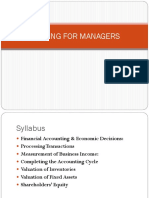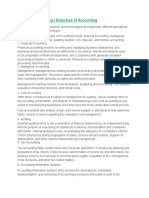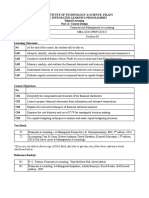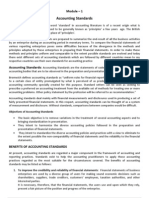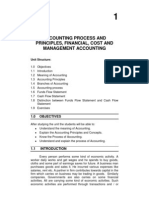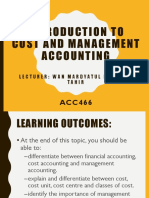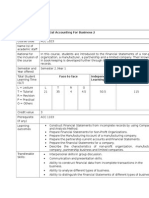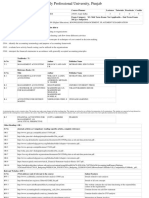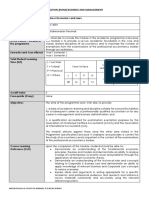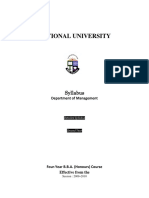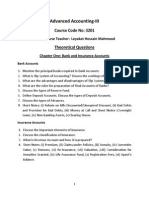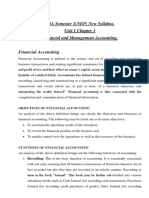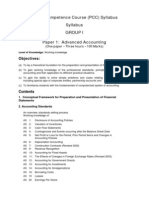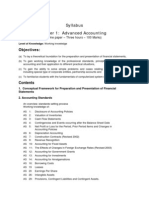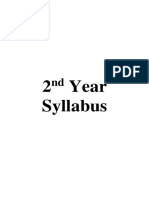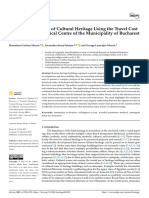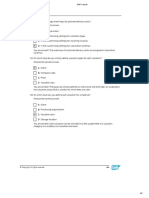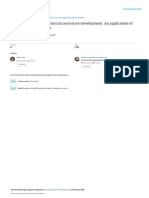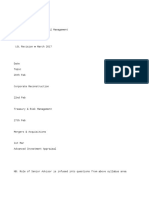NATIONAL UNIVERSITY
Fourth Year Syllabus
Department of Accounting
Four-Year B.B.A. (Honours) Course
Effective from the Session : 2013–2014
1
� National University
Subject: Accounting
Syllabus for Four-Year BBA Honours Course
Effective from the Session: 2013-2014
Year-wise Papers and marks distribution.
Fourth Year
Paper Code Paper Title Marks Credits
242501 Accounting Theory 100 4
242503 Advanced Auditing & Professional Ethics 100 4
242505 Accounting Information Systems 100 4
242507 Organizational Behavior 100 4
242509 Corporate Law and Practices 100 4
242511 Working Capital Management And Financial 100 4
Statement Analysis
242513 Advanced Accounting-II 100 4
242515 Investment Analysis and Portfolio Management 100 4
242517 Research Methodology (In English) 100 4
242518 Viva-voce 100 4
Total = 1000 40
2
� Detailed Syllabus
Paper Code : 242501 Marks : 100 Credits : 4 Class Hours : 60 hrs.
Paper Title : ACCOUNTING THEORY
1. Development of Accounting Theory: Historical Development.
2. Conceptual framework of Accounting and Reporting.
3. Agency Theory and need for Accounting.
4. Signaling Theory and Accounting Information, Contingency Theory, Institutional Theory,
Asymmetry of Information Theory, Bounded Rationality Theory and the Theory of
Knowledge.
5. Income concepts: Accounting and Economic Income, Hick’s Theory of Income, Capital
Maintenance, Hayek’s Capital Maintenance.
6. Hidden cost of control.
7. Earnings Management : Earnings Forecast Model, Smoothing and Big Bath.
8. Incentive Scheme : Profit Sharing, Share ownership, Share options, Accounting for share
options (IFRS2).
9. Contingencies and Disclosure, IAS 37.
10. Fair Value Measurement, IFRS 13.
11. Accounting covenants and Loan Agreement.
12. Capital Structure: Debt-equity, Free cash flow, Optimum Capital Structure, Nature of Assets
and Capital Structure.
13. Test of uses of Accounting Information: Market efficiency, CAPM.
14. Intangibles: Goodwill, Copyright, Patents, Brands, Trademarks, R&D, IAS 38.
15. Valuation: Cost, Replacement, Appraised Value, Market Value, Present Value, Arbitrary
Valuation, Tobins’ Q.
16. Regulation: IFRS, Standard setting process, GAAP, Differences in GAAP.
Books Recommended :
1. Richard G. Schroeder : Accounting Theory : Text and Readings
Myrtle W. Clark John Wiley & Sons., Inc.: NY, 1994
2. Dhiman Chowdhury. : Incentives, Control, and Development:
Governance in the Private and Public Sector
with Special Reference to Bangladesh, Dhaka
University, 2nd edition, Dhaka. 2012
3
� Paper Code : 242503 Marks : 100 Credits : 4 Class Hours : 60 hrs.
Paper Title : ADVANCED AUDITING & PROFESSIONAL ETHICS
1. International Standard on Auditing : Objectives and Basic Principles Governing an Audit :
ISA # 18, ISA @ 23, Auditing Engagement Letter ISA # 2, Planning ISA # 4, First Year
Audit Engagement : ISA @ 28 and other ISA.
2. Analytical Procedures (ISA 520) : Introduction, Nature and purpose of Analytical
procedures, Analytical Procedure and Risk Assessment Procedures, Substantive Analytical
Procedures, The Reliability of Data, Investigating Unusual items, Using the work of another
Auditor, Using the work of an expert.
3. Audit of a Limited Company : Qualification, Appointment, Remuneration of Auditors,
Power, Duties, Rights and Status of an Auditor, Auditor Report, Corporate Governance
Certification, Audit of Private Limited Company, Group of Companies, Holding Companies
and their Subsidiaries, Joint Audits, Responsibilities of Joint Auditor.
4. Government Audit : Nature and Objectives of Government Audit, Duties and Powers of
Comptroller and Auditor General, Audit Code of Government of Bangladesh. Audit against
Regularity, Audit of Grants and Aids, Local Authority Audit.
5. Management Audit : Development of Operational/Management Audit; Structure, Scope,
Need and Steps in Management Audit, Quality of Management Auditor, Function of
Management Auditor, Mechanism of Management Audit.
6. Cost Audit : History of Cost Audit, Reasons for introducing Cost Audit, Objectives of Cost
Audit, Advantage of Cost Audit, Cost Records, Qualification and appointment of Cost
Auditor, Commencement of Cost Audit, Area of Cost Audit, Cost Accounting Standard,
Legal Provision of Cost Audit in Bangladesh. The Role of ICMAB, Distinction between
Financial Audit and cost Audit. Cost Audit Report, Penalty, Cost Audit Procedure of Sugar,
Textile and Pharmaceutical Industries.
7. Basic Ethics : What is ethics, Moral reasoning, Moral principles, Why morality matters,
responsibility.
8. Business Ethics : Introduction, The moral purposes and limits of business activity, Key
moral rationships in business, Ethics in the public sector, conflicts of interest.
9. Professional Ethics : Professional moral responsibility, Duties to clients, The professional as
employee, obligation to third party, Obligations to the Profession and colleagues, Code of
Professional Ethics.
Books Recommended :
01. M. C. Shukla, T. S. Grewal & M. P. Gupta : Advanced Accounts (Latest Edition) S. C.
Chand & Co. Ltd.
02. Emile Woolf : Auditing Today (Latest Edition) Prentice
Hall Inc.
4
� Paper Code : 242505 Marks : 100 Credits : 4 Class Hours : 60 hrs.
Paper Title : ACCOUNTING INFORMATION SYSTEMS
1. The Information System: An accountant’s Perspective – The information environment, the
framework of AIS and the various sub systems. Organizational structure, The Role of the
Accountant. Accounting Information system – AIS and MIS – Accounting as a System –
Users of Accounting Information System – Management Structure Information Technology
and Corprate Strategy – The AIS and Corporate Strategy – How AIS can add Value to an
Organization – Models of Decision Making – Human Aspect of the AIS – Transaction
processing – Computer Hardware and Software in AIS – Computerized Accounting System –
Tools to implement Accounting Systems.
2. Introduction to Transaction Processing: An Overview of transaction Processing:
Transaction cycles; the expenditure cycle, Accounting record keeping, Audit Trail, The Chart
of Accounts, Different Methods Coding, Documentation techniques, Computer based
accounting Systems.
3. Data Processing and Data Based Management System (DBMS): Data Input, Data
Storage, Data Processing, Information Output, File-oriented Approach, Data Base Approach,
Logical and Physical Views of Data, Schemas, Data Dictionary, DBMS Languages,
Relational Data Bases, Data Based Management Systems (DBMS), Data Modeling and Data
Base Design, Introduction to E-Business.
4. Documenting AIS: Importance of Documentation, Document Flow Charts, Guidelines for
drawing DFC, System Flow Chart & DFD, System FC & Guidelines, Program FC, Decision
Table, Case Tool.
5. Ethics, Fraud and Internal Control: Ehtical issues in business, fraud and accountants,
Internal Control concepts and procedures, COSO Framework, Assessing and Managing Risk
Related to AIS, Computer Fraud and Security, Auding of Computer-Based Information
Systems.
6. Overview of sales, Purchase, Revenue and Expenditure Cycles: Overview of the manual
revenue system and study of CBAS. Study of the sales and purchases sub systems of an
organization, aimed at understanding them and how they link up with the main systems.
Overview of Purchases and cash disbursements, Computer based Purchases and Cash
disbursements. Payroll Activities, Computerized Payroll System. Threats, Exposures, and
control Procedures in the Revenue and Expenditure Cycles.
7. General Ledger, Financial Reporting and Management Reporting System: Data Coding
System, Financial Reporting System, Management Reporting Systems, Threats, Exposures
and Control Procedures in the Revenue and Expenditure Cycles.
8. AIS in Management Control: AIS Characteristics and Criteria for Management Control-
AIS Data Support for Management Control- AIS- MIS use Mix in Management Control-
Accountants and Management Control Interface – Management Control Decision Using AIS.
9. Strategic Decisions: DSS, AIS and AI/ES: AIS in Corporate Planning- Decision Support
System (DSS) – Artificial Intelligence (AI) and Expert Systems Operation and Evaluation.
10. Systems Organizations, Development and Management: Approaches to System
Development, AIS Development Strategies, System Development Life Cycle (SDLC).
5
�Books Recommended :
1. Accounting Information Systems , Marshall B. Romney and paul j.Stainbart, Prantice Hall.
2. Accounting Information Systems Wilkinson , Cerullo and Raval,Wong on Wing ,John Wiley
and sons
3. Core Concepts and Accounting Systems Stephan Moscove , Mark Simkin and Nancy
Bagranoff, John Willey &Sons ,Inc.Copyright 2003
4. Accounting Information Systems: Principles , Applications And future Directions, Rahman,
M. and Halladay, Prantice Hall - Inc.
Paper Code : 242507 Marks : 100 Credits : 4 Class Hours : 60 hrs.
Paper Title : ORGANIZATIONAL BEHAVIOR
1. Key elements of OB : Organizations, Ownership, size, organizational structure, goals and
plans, understanding OB, history, OB and related disciplines.
2. Anthropology: Evolution of man, transformation of society, man and interactions, Darwin,
Lamarck, George Herbert Mead’s sociology of thinking.
3. Cognitive System : Memory, working, memory, long term memory, cerebral cortex,
information processing approach, implicit memory and explicit memory, physiological basis
of learning, bounded rationality, cognitive development, socio-biological differences in man,
cognitive development, internal conversation theory.
4. Self-interest behavior : Agency relation, division of labor, separation of ownership from
control, asymmetry of information, social stratification, moral hazard and adverse selection,
Kenneth Arrow’s signaling theory and uncertainties, anthropology and agency relation,
division of labor, Adam Smith, Berlee and Means, Michael Jensen, agency costs.
5. Belief versus knowledge : Rituals, fixed beliefs, revision of belief, justified belief,
information vs knowledge, imperfections of knowledge, independent reasoning, David
Hume’s theory of understanding, Emmanuel Kant’s pure reason, Friedrich Hayek, Aristotle.
6. Personality : Types, traits, disorder, development, narcissistic, theories.
7. Attitudes, Perception : Perceptual set and assumptions about behavior, sex, appearance,
attractiveness, discrimination, errors, communication, interpersonal communication.
8. Selection, Staffing and Training : Planning of needs, advertisement, applications, process,
committee system, training design, methods, evaluation.
9. Work conditions and job satisfaction : Job analysis, satisfaction assessment, effects,
organizational commitment, organization citizenship behavior.
10. Group Behavior : Various groups, structure, process, decision making, external conditions
imposed on groups, teams vs groups, Hawthorn study.
11. Labor-management relations : Collective bargaining agent, process, labor management
committee, regulation, employment law, negotiation skill.
12. Conflicts and negotiations : Functional and dysfunctional conflicts, coordination conflict
model.
13. Leadership: Theories, style, contingency theory, traits, skills.
14. Culture, power and politics : Various types of power, person culture, role culture, task
culture, corporate culture, national culture.
6
�15. Motivation Theories: Maslow, Hertzberg, expectancy theory, equity theory, goal setting
theory, refinement theory.
16. Stress and counseling: Work schedules, job stress, burnouts, health and safety, accidents,
types of counseling.
17. Grievance System : Non-union grievance system, open door policy, ombudsperson, hearing
officer, peer decision making committee, outside arbitration, organizational justice,
distributive, procedural, interactional.
18. Appraising and rewarding performance : Individual and organization performance,
measures of performance, reward systems, performance related pay.
19. Change Management : Causes, resistance, dealing with resistance, strategic change,
business process reengineering.
20. Corporate social responsibility : Shareholders vs stakeholders, environment, disclosures,
economic, legal, ethical, discretionary responsibilities, evaluation.
21. Behavior in Accounting : Imposed vs accepted budget, budget slack, disclosure, limitations
of accounting measures of performance, responsibility accounting, accounting covenants,
control.
Book Recommended :
1. Keith Davis : Organization Behavior : Human behavior at
work, Mc-Graw-Hill, 2002
Paper Code : 242509 Marks : 100 Credits : 4 Class Hours : 60 hrs.
Paper Title : CORPORATE LAW AND PRACTICES
1. Introduction : Background and evolution of Company Law, Definition. Legal
Characteristics, General Characteristics, Artificial person.
2. Types of Companies : Private Limited Companies, Public Limited Companies, Unlimited
Liability Company, Cooperatives Foreign Companies.
3. Formation of Company : Registration, Promoters, Memorandum & Articles of Association.
4. Capital Formation : Capital, Prospectus, Commission & Brokerage.
5. Shareholders of the Company : Membership of the Company, Share and call, Share
transfer.
6. Contracts of the Company : Nature of the contracts, Contracts of company under different
situations, New contracts & pre-incorporation contracts etc. Ultra vires contracts.
7. Borrowing of the Company : Borrowing power & procedures, Debenture.
8. Company’s Management & Administration : Nature of Management, Directors, Company
Secretary, Managing Agent, Meeting & Resolutions.
9. Accounts & Audit of Company : Accounts of Companies, Auditors of Companies.
7
�10. Dividends : Meaning, Types, Policies.
11. Transformation & Winding up of Company : Merger & Reconstruction, Liquidation.
Books Recommended :
1. M.A. Zahir : Companies Act
2. Companies Act, 1994
Paper Code : 242511 Marks : 100 Credits : 4 Class Hours : 60 hrs.
Paper Title : WORKING CAPITAL MANAGEMENT AND FINANCIAL STATEMENT
ANALYSIS
A. Working Capital Management : (60%)
1. Introduction : Concept of Working Capital, Components of Working Capital, Nature of
Working Capital, Kinds of Capital, Importance of Adequate Working Capital, Inadequacy of
working Capital, Dangers of Inadequate or Excessive Working Capital, Determinants of
Working Capital, Sources of Working Capital, Management of Working Capital, Working
Capital Forecasting, Working Capital Cycle.
2. Management of Cash and Marketable Securities : Managing Cash Inflows and Outflows,
Cash Forecasting, Models for the Management of Cash and Temporary Investments.
3. Receivables Management and Credit Policies : Terms of Sales Decisions, Credit Granting
Decision, Monitoring Accounts Receivable.
4. Inventory Management : Certainty Approach, Uncertainty Approach.
5. Management of Short-Term Liabilities : Calculating the Cost of Short-Term Financing
from Different Sources, The Sequential Method of Formulating a Structure of Current Debts,
The Integer Programming Approach to Structuring Current Debts.
B. Financial Statement Analysis (40%)
6. A Preview of Company Fundamentals : Qualitative Information and Their Interpretation,
Supply of Accounting Statement Information, Regulatory Bodies and Their Role, Market
Demand and Supply of Information.
7. Basic Financial Statement Analysis Techniques : Broad Guidelines for Financial
Statement Analysis, Techniques of Financial Statement Analysis, Absolute Studies :
Comparative Statements, Time Series Techniques, Trend Statements, Supplementary
Statements.
8. Ratio Analysis: Profitability, Liquidity, Solvency, Growth and Overall Ratios, Market Test,
Significance and Limitations of Ratio Analysis.
Books Recommended :
1. Scherr, F.C : Modern Working Capital Management : Text
and Cases
8
�2. Hampton : Working Capital Management.
3. Bernstein, L.A and J.J. Wild : Financial Statement Analysis
Paper Code : 242513 Marks : 100 Credits : 4 Class Hours : 60 hrs.
Paper Title : ADVANCED ACCOUNTING-II
A. Financial Accounting
1. Valuation of Goodwill and Shares : Nature of Goodwill, Types of Goodwill, Methods of
Valuing Goodwill, Valuation of Shares, Need for Valuation, Methods of Valuation.
2. Royalty Accounts : Royalty, Minimum Rent, Short workings, Recoupment of Short
working, Accounting Entries in the Books of Leassee and Landlord, Sub-lease.
3. Business Combination : Accounts for Business Purchase, Amalgamation, Absorption and
Reconstruction of Companies (IAS)#, Introduction to Inter-Corporate Investment and
Business Combinations, Consolidated Statements on Acquisition Date and After Acquisition
Date, Intercompany Sale of Inventory, Land and other Assets, Intercompany Profits in
Depreciable Assets.
4. Double Account System : Features of Double Account System, Differences between Single
Account System and Double Account System, Double Account System and Double Entry
System, Advantages and Disadvantages of Double Account System, Preparation of Revenue
Account, Net Revenue Account, Capital Account and General Balance Sheet, Extension and
Replacement of Fixed Assets.
5. Branch and Department Accounts :
6. Accounting for Foreign currency Transactions ad Reporting of Foreign Operations.
B. Government Accounting, Non-Profit Organaization and NGO Accounting.
7. Government Accounting and Reporting : Accounting Principles of Government Units, The
Fund Structure, Integration of Budgetary Accounts, The Basis of Accounting.
8. Government Budgeting : Budget for Resource Management, Program Budget, Budget
Preparation and Budget Administration.
9. General Fund and Special Revenue Funds : Journalizing, Ledger Posting, Preparation of
interim and Year-end Financial Statements.
10. Operation and Accounting Procedures : Capital Project Funds, Debt Service Funds,
Special Assessment Funds, Internal Service Funds, Enterprise Funds, Trust and Agency Funds.
11. Non-Profit Organization and its Accounts : Accounting for Clubs, Hospitals, Educational
Institutes, Capital Fund, Receipts and Payments Accounts, Income and Expenditure
Statement, Balance Sheet.
12. Account for NGO : System of keeping Accounts by NGO, Project-wise Accounting.
9
�Books Recommended :
1. Donald E. Keiso, Jerry J. Waygandt : Intermediate Accounting
and Terry D. Warfield
2. Mukherjee and Hanif : Modern Accountancy (Volume Two)
3. Hay, Leon E : Accounting for Governmental and Non-Profit
Entries
4. Edwards S. Lynn and Robert J., Freeman : Fund Accounting : Theory and Practice
Paper Code : 242515 Marks : 100 Credits : 4 Class Hours : 60 hrs.
Paper Title : INVESTMENT ANALYSIS AND PROTFOLIO
MANAGEMENT
1. Introduction : An Introduction to Investment, Securities, Securities Analysis, Portfolio and
Portfolio Management.
2. Investment : Business Investment and Financial Investment, Risk and Uncertainty, Different
types of Risk, The Relationship between Risk and Return, Determinants of Required rate of
Return, Selecting Investment in Global Market.
3. The Role of Financial Market : Financial Market, Primary Market, Secondary Market,
Regional exchanges and over the Capital Market, Detailed Analysis of Exchange Market,
How Securities are Traded, Types of Order, Market Index, Stock Market Indicator Series,
Derivative Markets and Securities, Types of Derivative, Forward and Future Markets and
Option Markets.
4. Investment Theory : Efficient Market Theory, Alternative efficient Market Hypothesis
(EMH), Utility Theory, Optimum Portfolio and Portfolio Theory, Makrowitz Portfolio
Theory.
5. Pricing Models : Capital Assets Pricing Model Assumption, Expected Return and Risk on a
Risky Asset, the Security Market Line, Arbitrage Pricing Model (APM), Assumptions the
Theory, The CAPM and APM, A Multifactor APM, Empirical Tests of the APM.
6. The Financing Decision : The Uses ad Limitations of Weighted Average Cost of Capital,
Adjusted present value, The Modigliani-Miller Proposition, The Optimal Capital Structure.
7. The Valuation of Securities : Valuation Process, The Theory of Valuation, Valuation of
Alternative Investments : Bonds, Preferred Stock and Common Stock, Option Valuation,
Swap Contracts, Convertible Securities and Other embedded Securities.
8. Investment Companies and Evaluating Portfolio Performances : The Asset Management
Industry, Managing Client Portfolios, Management of Investment Companies, Closed-End vs
Open-End Investment Companies, Global Investment Companies, Performance Measures :
Sharpe’s Measure, Treynor’s Measure, Jensen’s Measure and Appraisal Ratio.
10
�Books Recommended : (Latest Edition)
1. Reilly, Frank K. and Keith Brown : Investment Analysis and Portfolio Management
2. Haugen, R.A : Modern Investment Theory
Paper Code : 242517 Marks : 100 Credits : 4 Class Hours : 60 hrs.
Paper Title : RESEARCH METHODOLOGY (IN ENGLISH)
1. Introduction : The Role of Business Research, Information System and knowledge t
Management, Theory Building, The Business Research Process : An Overview, The Human
Side of Business Research : Organzational and Ethical Issues.
2. Beginning Stages of the Research Process : Problem Definition : The Foundation of
Business Research, Qualitative Research Tools, Secondary Data Research in a Digital Age.
3. Research Methods for Collecting Primary Data : Survey Research : An Overview, Survey
Research : Communicating with the Respondents, Observation Methods, Experimental
Research.
4. Measurement Concepts : Measurement and Scaling Concepts, Attitude Measurement,
Questionnaire Design.
5. Sampling and Field Work : Sampling Designs and Procedures, Determination of Sample
Size : A Review of Statistical Theory, Fieldwork.
6. Data Analysis and Presentation : Editing and Coding : Transforming Raw Data into
Information, Basic Data Analysis : Descriptive Statistics, Univariate Statistical Analysis,
Bivariate Statistical Analysis : Differences between Two Variables, Bivariate Statistical
Analysis : Measures of Association, Multivariate Statistical Analysis.
7. Research Report : Report Writing-Preparation of Research Report, Oral Presentation and
Follow-Up.
Books Recommended : (Latest Edition)
1. Doland Cooper, Pamela Schindler : Business Research Methods, Latest ed., Mc
Graw Hill
2. C. R. Kothari : Business Research Methods, Latest ed., New
Age International Publishers
3. Willim G. Zikmuns, Barry J. Babin : Business Research Methods, Latest ed., South
Jon C Carr, Mitch Griffin Western Publisher
Paper Code : 242518 Marks : 100 Credits : 4 Class Hours : 60 hrs.
Paper Title : Viva-Voce
11




